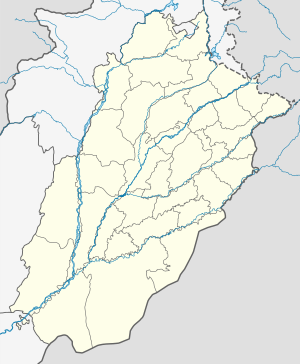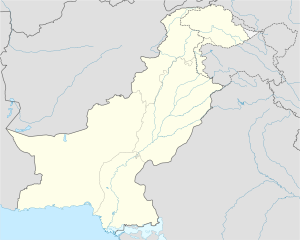Narowal
This article needs additional citations for verification. (February 2023) |
Narowal
نارووال | |
|---|---|
 Faiz Ahmed Park | |
| Coordinates: 32°6′0″N 74°52′29″E / 32.10000°N 74.87472°E | |
| Country | |
| Province | |
| Division | Gujranwala |
| District | Narowal |
| Area | |
• Total | 200 km2 (80 sq mi) |
| Population | |
• Total | 130,692 |
| • Rank | 91st in Pakistan (2023) |
| Demonym | Narowali |
| Time zone | UTC+5 (PST) |
| Postal code | 51600 |
| Area code | 0542 |
| Number of Universities | 4 |
| Number of Medical Colleges | 1 |
| Language | Punjabi |
| Sex ratio (male/female) | 103.48 |
| Website | http://www.narowal.gop.pk/ |
Narowal (Punjabi / Urdu: نارووال; pronounced [näɾoːˈʋälᵊ]) is a city located on the western bank of river Ravi in the northeast of the province Punjab in Pakistan. The city is the capital of district Narowal, and a part of the Gujranwala division. It is the 94th largest city of Pakistan.[2] The economy is largely agriculture-based but Football production and handicrafts industries also exist. Narowal houses many universities campuses, including the University of Narowal, University of Engineering and Technology Narowal Campus and the University of Veterinary and Animal Sciences Narowal Campus. The fertile land of Narowal produces one of the supreme quality rice in Pakistan.
A famous Sikh Temple, Gurdwara Darbar Sahib Kartarpur lies in the East of Narowal.[3]
Geography
[edit]Narowal lies from 31° 55' to 32° 30' latitude and 74° 35' to 75° 21' longitude. It is located in the northeast part of Punjab, Pakistan, about 96 kilometers north of the provincial capital Lahore. The Narowal District borders Sialkot to the west, Sheikhupura to the South, Gurdaspur (Eastern Punjab, India) to the east, and the Kathua District and Jammu Kashmir to the north.
Etymology
[edit]Although contradictory beliefs exist, the widely held narrative states that Narowal derived its name from a landlord Naro Bajwa back in the 16th-century.
History
[edit]In the sixteenth century, Narowal was a small village consisting of only a few houses of labourers around the farmhouse of Land-Lord Naro Bajwa.[4] The city is the capital of Narowal District. The history of modern Narowal dates back to 90 years when Britishers established a railway link between eastern and western Punjab in its bid to strengthen their grip over Punjab. With the establishment of the railway junctions, investment begins to flow and the city begins to flourish with the passage of time. After the partition and establishment of Pakistan, the railway line between the east and west Punjab was blown off for security reasons. Initially, Narowal was a part of Sialkot district, later gained the status of Tehsil before becoming the District in 1992.
Demographics
[edit]| Year | Pop. | ±% p.a. |
|---|---|---|
| 1972 | 22,174 | — |
| 1981 | 35,125 | +5.24% |
| 1998 | 57,052 | +2.89% |
| 2017 | 103,067 | +3.16% |
| 2023 | 130,692 | +4.04% |
| Sources:[5] | ||
The population of Narowal consists of various ethnic groups including Punjabi almost 80%, the peoples who migrated from India to Pakistan in 1947 during partition (in Pakistan they are known as Muhajir) 19%, and Pathan including other minor groups 1%. Punjabi is the predominant Language with Urdu second large language.[6]
The majority religion is Islam, at 98%. Christians make up 1.5% of the population and Hindus and Sikhs make up the other 0.5%.
Economy
[edit]
Narowal is an agro-based economy. Its fertile field produces high-quality rice, wheat, maze, corn, and Sugar cane. Rice especially produced in Narowal, is a major export and earn foreign exchange reserves for Pakistan. Wheat production secures food security of the country.[7] Except that football manufacturing especially stitching, handicraft is included among industries of Narowal. Various bazaars including Zafarwal Road bazaar, Railway Bazar, Chota Bazar, are famous commercial points while Circular Road Narowal is emerging as a new business hub in the city.
Education
[edit]Narowal is known as the "House of knowledge". Its literacy rate is highest among neighbour districts. It is the house of various universities and colleges.
List of Universities in Narowal:
- University of Narowal (UON)
- University of Engineering and Technology, Lahore, Narowal campus
- University of Veterinary and Animal Sciences, Narowal campus
- Virtual University of Pakistan
- University of Gujrat(UOG), Narowal campus.University of Narowal used to be called as University of Gujrat(UOG)but later on UON got independent and now there is not a single Campus of University of Gujrat in Narowal.
Also there is a regional office of Allama Iqbal Open University in Narowal city.
- list of colleges in Narowal:
- Narowal public school and college Narowal
- KIPS college Narowal
- Royal college of sciences, Narowal
- Punjab group of colleges, Narowal
- Aspire college, Narowal
- Govt. postgraduate College for women, Narowal
- Degree college for boys, Narowal
and a lot of other private and public sector colleges.
List of medical colleges:
- Narowal medical college, Narowal (public sector)
- Sahara medical college, Narowal (private)
- Al-shifa medical college, Narowal (private)
Narowal public school is one of the largest and best educational institutions in Narowal. There are many other schools like The Educators, Dar e Arqam school system, Hassan Scholars public school and IIUI school system etc. C.M.S. High School Narowal is the oldest school in the region, owned by the famous L.D.BE. Which is the same system that owns institutes like Forman Christian College, Kinnaird College, and Cathedral schools Lahore.
References
[edit]- ^ Citypopulation de Population of Narowal Municipal Council
- ^ "Narowal District Population of Cities, Towns and Villages 2017–2018". 2018-05-23. Archived from the original on 2019-10-21. Retrieved 2019-10-21.
- ^ "Kartarpur Gurudwara of Pakistan is going to be Mecca for Sikhs - FPINFO.IN". Archived from the original on 2019-11-06. Retrieved 2019-11-06.
- ^ "District History – Narowal's Official Website". Archived from the original on 2019-11-06. Retrieved 2019-11-06.
- ^ "Population by administrative units 1951-1998" (PDF). Pakistan Bureau of Statistics.
- ^ "Letter Report to the Bureau of Transportation Statistics". The National Academies Press. 2004. doi:10.17226/10938. Archived from the original on 2021-10-08. Retrieved 2021-01-12.
{{cite journal}}: Cite journal requires|journal=(help) - ^ "Pakistan", Economic and Social Survey of Asia and the Far East 1956, Economic and Social Survey of Asia and the Pacific, UN, pp. 147–154, 1956-12-31, doi:10.18356/8855fdb8-en, ISBN 978-92-1-059935-1, archived from the original on 2021-10-08, retrieved 2021-01-12
External links
[edit]- Profile of Narowal District
- UET's official website.
- Official Website of District Government Narowal
- Construction Company in Pakistan


